外研高二选修7 Module 5 Ethnic Culture 模块复习课件(66张)
文档属性
| 名称 | 外研高二选修7 Module 5 Ethnic Culture 模块复习课件(66张) |
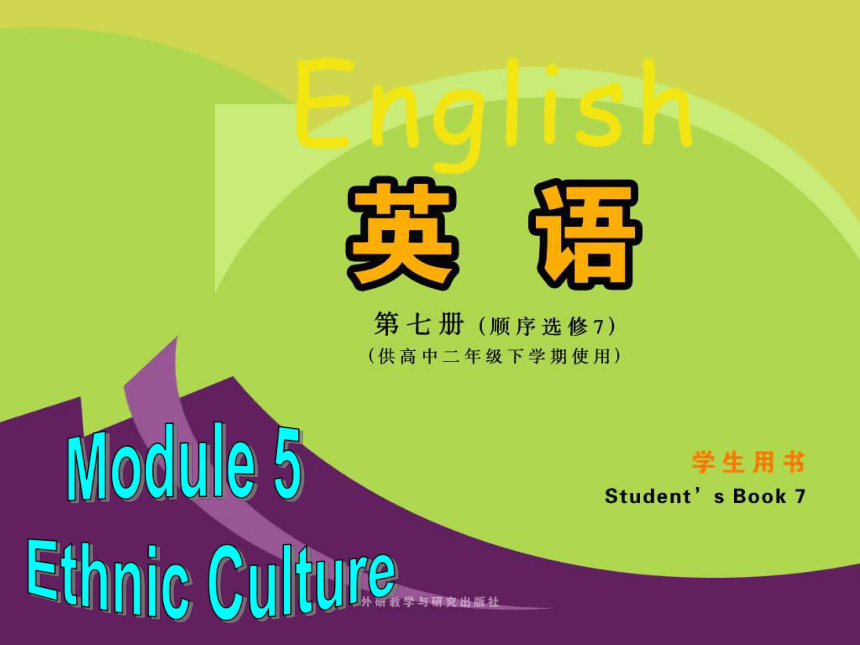
|
|
| 格式 | zip | ||
| 文件大小 | 603.2KB | ||
| 资源类型 | 教案 | ||
| 版本资源 | 外研版 | ||
| 科目 | 英语 | ||
| 更新时间 | 2017-01-18 00:00:00 | ||
图片预览

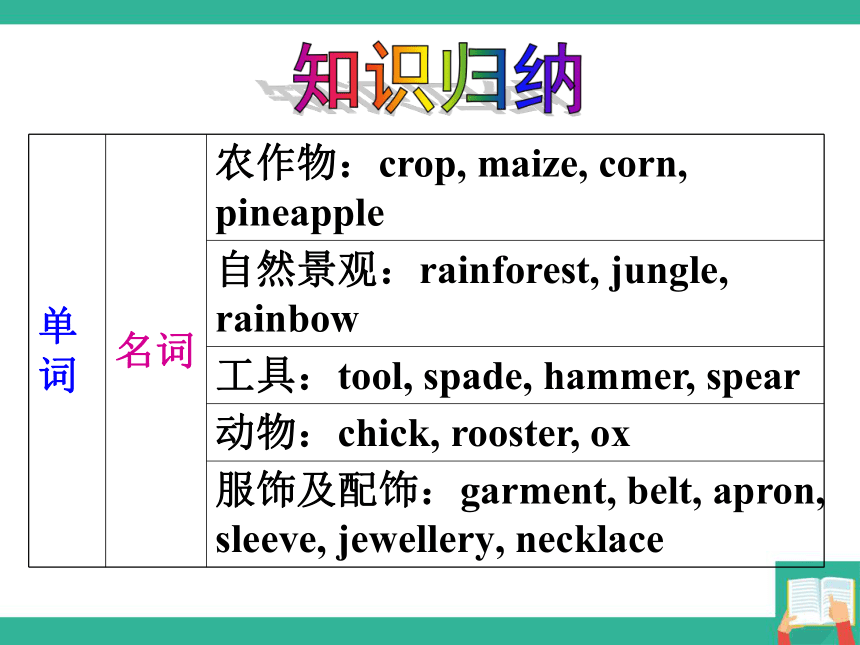
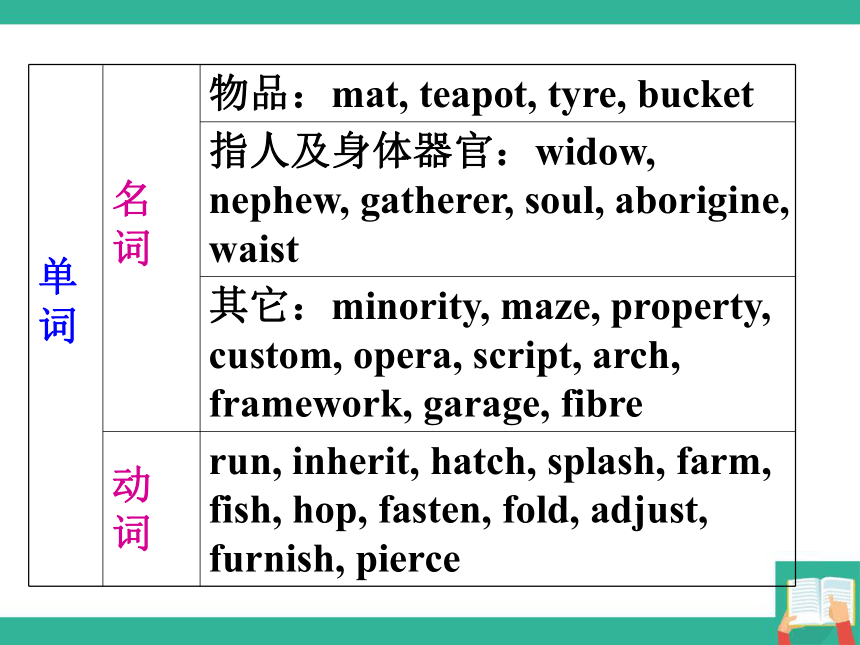
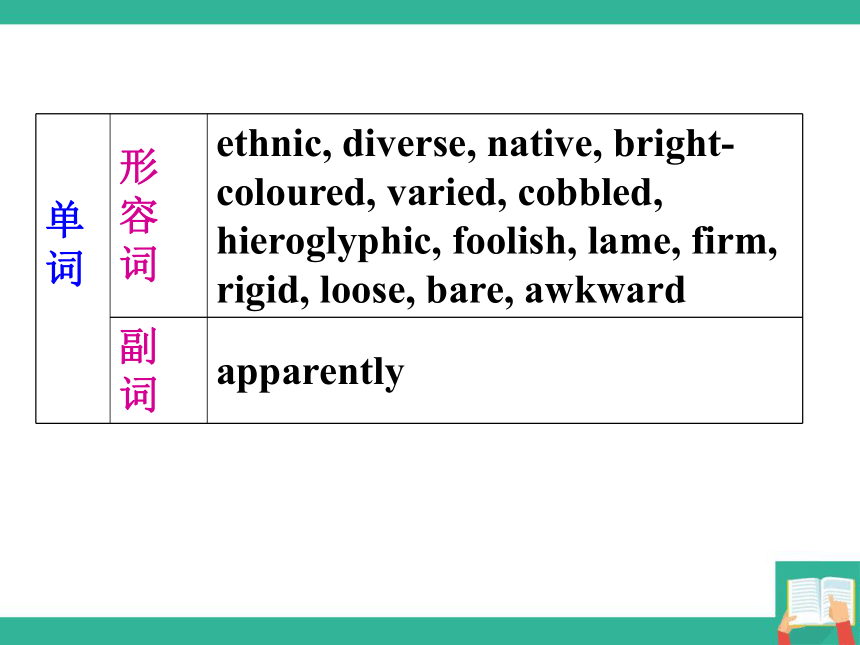
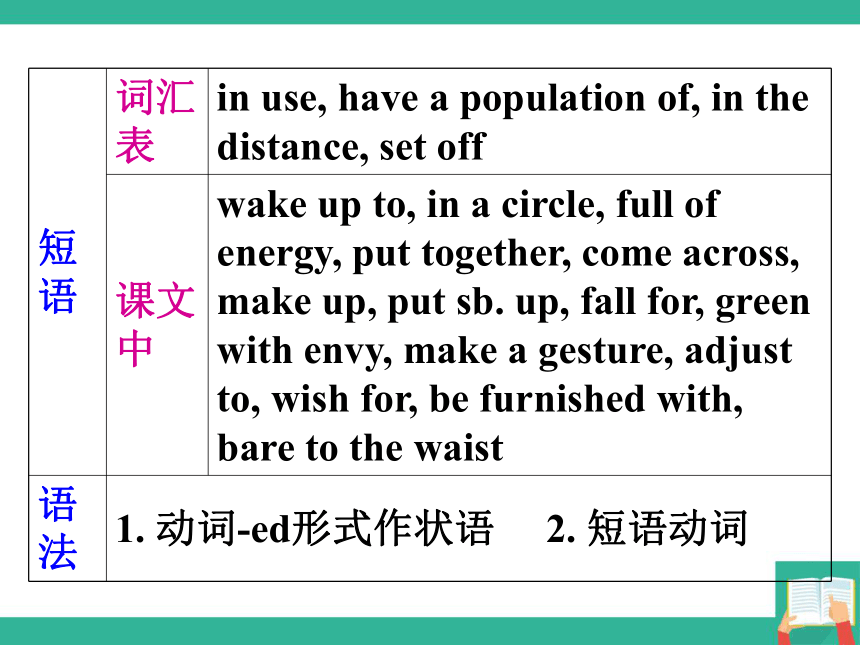
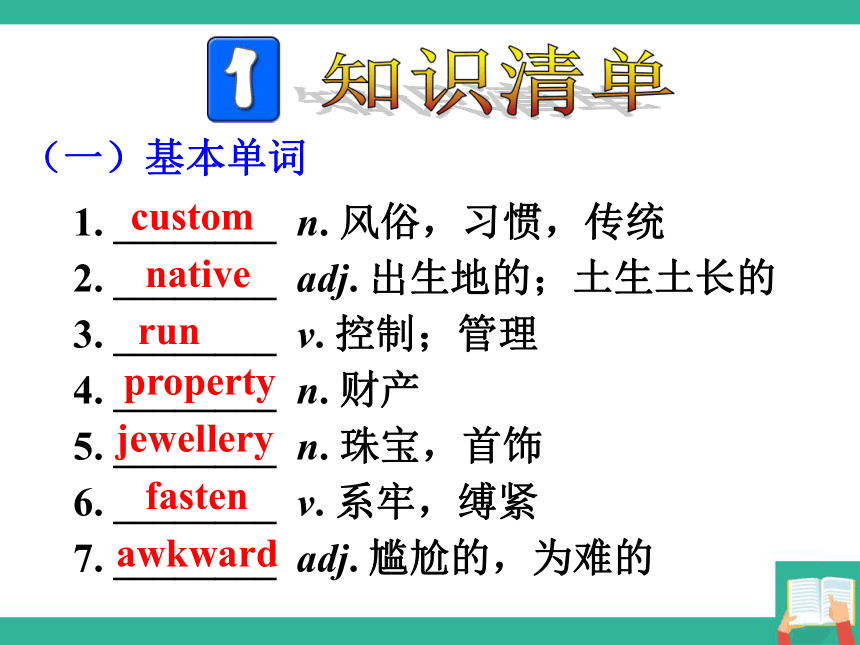
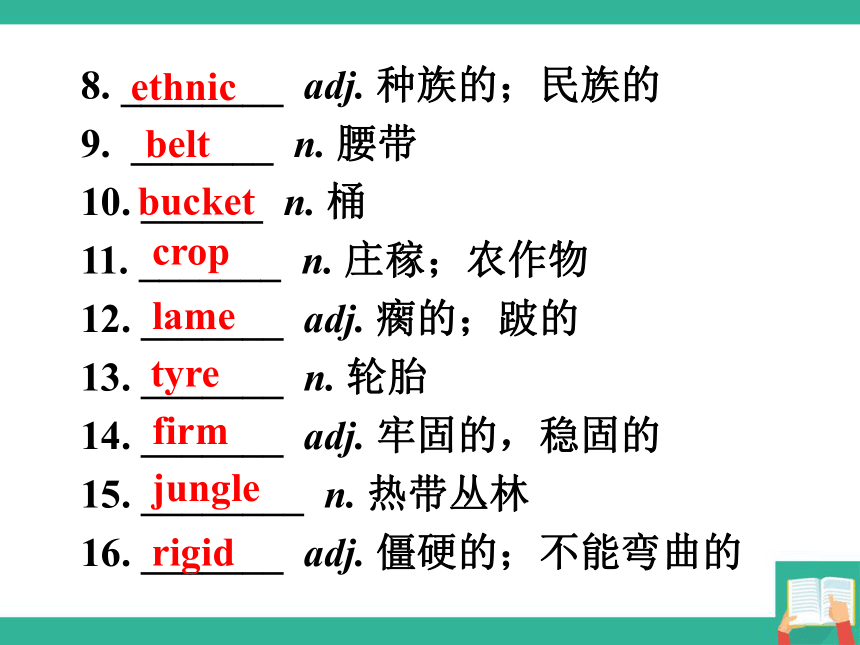
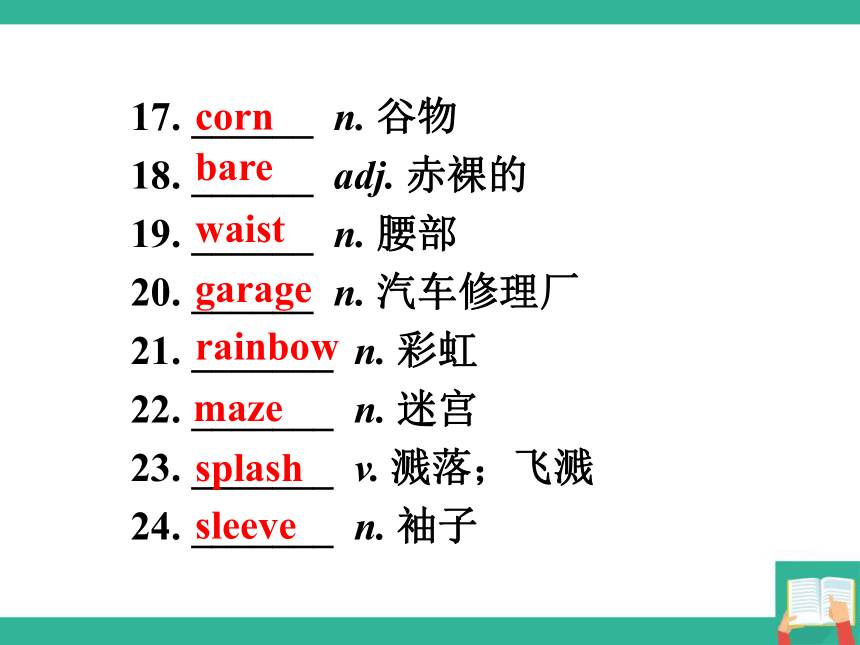
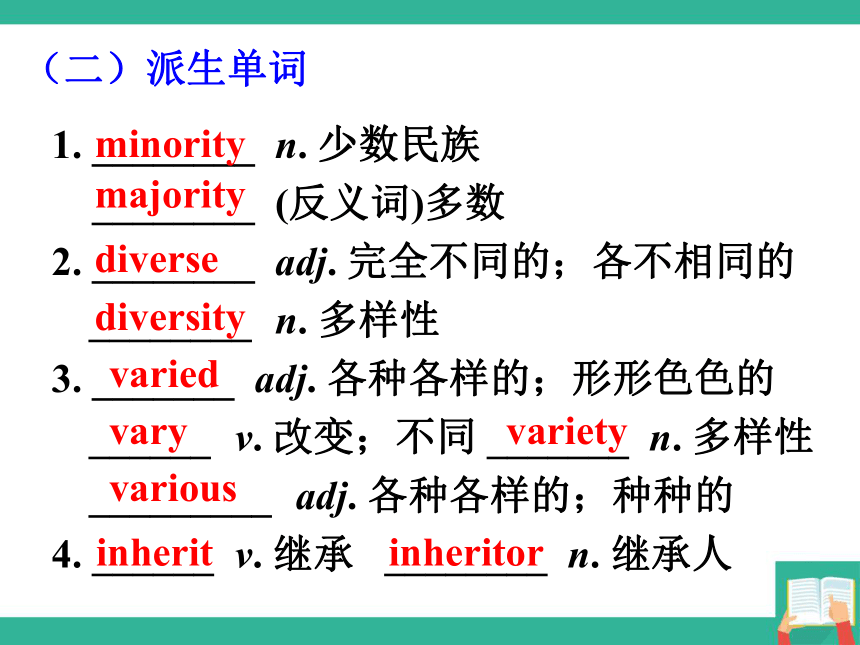
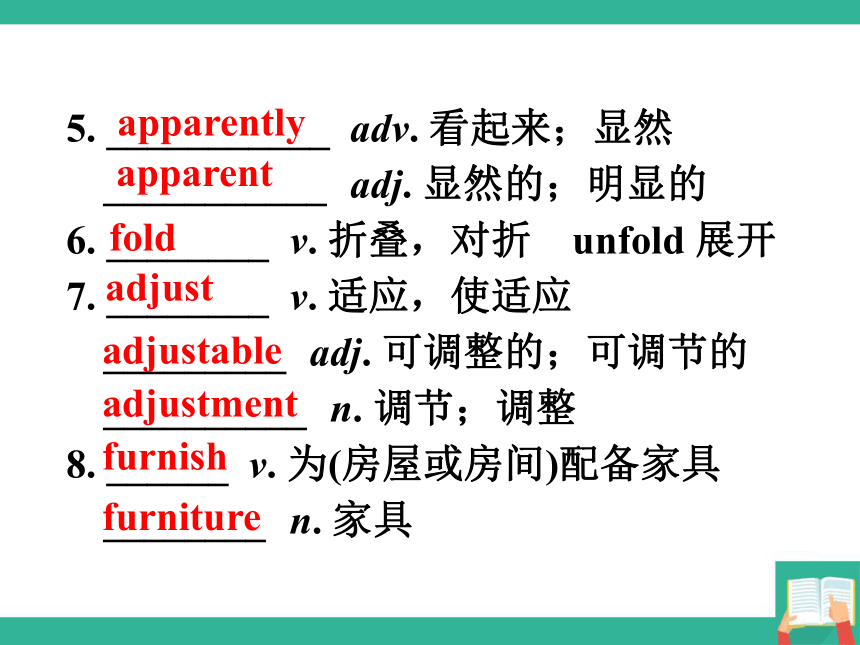
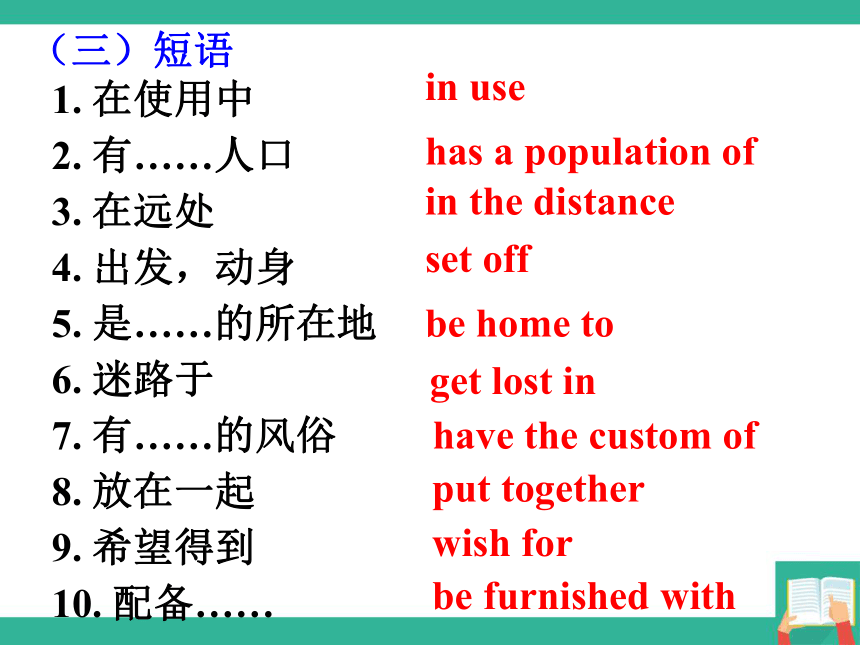
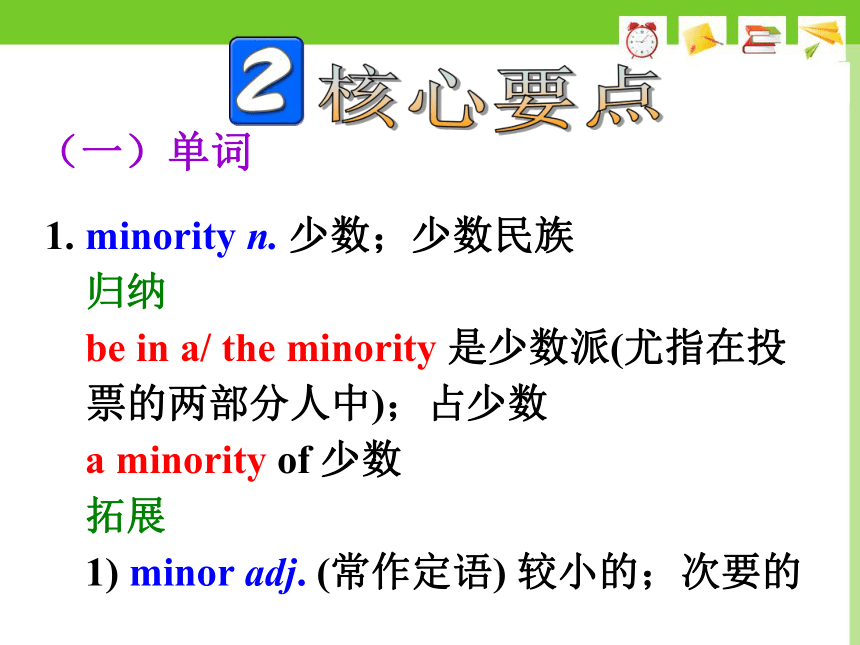
文档简介
课件66张PPT。Module 5
Ethnic Culture知识归纳1. ________ n. 风俗,习惯,传统
2. ________ adj. 出生地的;土生土长的
3. ________ v. 控制;管理
4. ________ n. 财产
5. ________ n. 珠宝,首饰
6. ________ v. 系牢,缚紧
7. ________ adj. 尴尬的,为难的知识清单(一)基本单词customnativerunpropertyjewelleryfastenawkward8. ________ adj. 种族的;民族的
9. _______ n. 腰带
10. ______ n. 桶
11. _______ n. 庄稼;农作物
12. _______ adj. 瘸的;跛的
13. _______ n. 轮胎
14. _______ adj. 牢固的,稳固的
15. ________ n. 热带丛林
16. _______ adj. 僵硬的;不能弯曲的beltbucketcroplametyrefirmjunglerigidethnic17. ______ n. 谷物
18. ______ adj. 赤裸的
19. ______ n. 腰部
20. ______ n. 汽车修理厂
21. _______ n. 彩虹
22. _______ n. 迷宫
23. _______ v. 溅落;飞溅
24. _______ n. 袖子barewaistgaragerainbowmazesplashsleevecorn1. ________ n. 少数民族
________ (反义词)多数
2. ________ adj. 完全不同的;各不相同的
________ n. 多样性
3. _______ adj. 各种各样的;形形色色的
______ v. 改变;不同 _______ n. 多样性
_________ adj. 各种各样的;种种的
4. ______ v. 继承 ________ n. 继承人(二)派生单词minoritymajoritydiversediversityvariedvary varietyvariousinheritinheritor5. ___________ adv. 看起来;显然
___________ adj. 显然的;明显的
6. ________ v. 折叠,对折 unfold 展开
7. ________ v. 适应,使适应
_________ adj. 可调整的;可调节的
__________ n. 调节;调整
8. ______ v. 为(房屋或房间)配备家具
________ n. 家具apparentlyapparentfoldadjustadjustableadjustmentfurnishfurniture1. 在使用中
2. 有……人口
3. 在远处
4. 出发,动身
5. 是……的所在地
6. 迷路于
7. 有……的风俗
8. 放在一起
9. 希望得到
10. 配备……(三)短语in usehas a population ofin the distanceset offbe home toget lost inhave the custom ofput togetherwish forbe furnished with1. minority n. 少数;少数民族
归纳
be in a/ the minority 是少数派(尤指在投票的两部分人中);占少数
a minority of 少数
拓展
1) minor adj. (常作定语) 较小的;次要的核心要点(一)单词2) (反) majority用作可数名词时,“多数,大多数;过半数”。
常与定冠词the和介词of连用,构成词组the majority of...。the majority of... 作主语时,其后的谓语动词单复数取决于of之后的名词。
3) the majority/ minority 单独作主语时,谓语动词既可用单数,也可用复数。2. run v. 控制,管理,经营;(交通沿规定路线) 往来行驶;(颜色)褪色
归纳
1) well/ badly run 经营良好/不好
run a hotel/ company 经营一家旅馆/公司
2) run after 追赶某人,追逐某物
run across 偶然遇见某人或发现某物
run into 偶遇
run out 花光,用完run away 逃离
run away from 从……跑掉,逃避
run away with 偷了……跑掉
run for 竞选 run for it 逃跑,快跑
run into 遇上,陷入
run out (of) 用完(某物)
run over 碾压
run through 匆忙看一遍
run to 达到(某个数量、长度等)
in the long / short run从长远 / 短期看来根据括号内所给汉语提示完成下列句子。
1. He __________(偶然发现)her name in the phone book and gave her a call immediately.
2. The sugar has ___________(用完了). We have to buy some this afternoon.
3. The old man provided an idea for his son on how to _______________(开饭店).ran acrossrun out?run a restaurant3. fasten v. 固定某物;系牢,扎牢;盯住;集中注意力于……
归纳
fasten...on/ to... 把……固定到……上
fasten A and B together
把A与B联结在一起
fasten on/ upon 抓住;缠牢;盯住
fasten up 系住,拉链拉好
fasten one’s attention on 集中注意力于
fasten your eyes on 注视着,盯着根据括号内的提示完成下列句子。
1. The dog _______________ (被拴在) a post by a chain.
2. The old lady ___________________ (注视着) the stranger.was fastened to?fastened her eyes on 4. adjust v. 使适应;调整;安排;校准
归纳
adjust to... / doing … 适应……
adjust sth./ oneself to sth.
使某物或某人适应(新环境等),适应……
拓展
adjustment n. 调整,校正,适应
make adjustments to
对……进行调整,调节,校正根据汉语提示,将下列句子补充完整。
1. I must _________________ (把我的表调准) because it’s fast.
2. It can be difficult to ___________________
_______ (适应做一位父/母亲).
3. This kind of desk can __________________
_______________ (调节到你需要的高度).
4. He __________________________________
_______________________(使自己很快适应了这个国家炎热的气候).adjust my watchadjust to being abe adjusted to theadjusted himself very quickly to the parentheight you needhot weather of the country5. furnish v. 为(房间)配备家具;供应;装备
归纳
furnish... with... 用……装备……
furnish... to/ for 为……提供……
be furnished with 备有,安装有,陈设有
拓展
furniture n. 家具(集合用法,不可数名词)
a piece of furniture 一件家具
a suite of furniture 一套家具6. native n.& adj.
归纳
1) n. 当地居民;本地人;天然生长于某地的动物或植物
adj. 出生地的,与出生地有关的;当地人的;天赋的,天生的
2) be native to 是……天生的
be a native of 是……的人(特产);
native speakers 说母语的人7. bare adj. 赤裸的;空的
辨析empty, vacant, hollow, bare与blank
empty “空的”,指某物缺少其常有的东西。
也可引申为“空洞的,空虚的”。
e.g. The room is empty of furniture.
vacant “空着的,未被占用的”,常指房
子、座位、职位等。
e.g. The room is vacant.hollow “中空的,空心的”,与solid相对。
e.g. A water pipe is hollow.
bare “(房间、柜子等)空的,裸露的,无
遮盖的”。
e.g. a bare room, bare arm, bare walls.
blank 表面没有任何东西或表面是空白的,
也可引申为“没表情的”。
e.g. a blank wall, a blank expression.1. in use 在使用,在应用中
拓展
come into use 开始被使用
make use of sb./ sth.
利用或使用某人/某物
bring... into use 启用
put... to use 使用
of use=useful 有用的
It’s no use doing... 做……没用 (二)短语2. set off 动身,出发;爆炸;使某人开始
做……
拓展
set aside 把……放置一旁;不理会;取消
set down 放下,坐下;制定,确定;记下
set back 向后移,推迟;拨慢
set out 着手,开始;安排
set up 建立;产生,使引起;计划3. in the distance 在远处
拓展
at a distance 隔开一段距离,有些距离
from a distance 由远处
a distance of... 距离……
keep one’s distance from...
与……保持距离
keep sb. at a distance
与某人保持相当距离;对某人表示冷淡Exercises根据提示写出所缺单词的正确形式。
1. If the chair is too high you can a________ it to suit you.
2. Children need to be taught to have respect for other people’s ________ (财产).
3. I realized they wanted to be alone together so I felt very a________.
4. It would be ________ (愚蠢的) to pretend that the accident never happened.adjust?property?awkwardfoolish用适当的介词或副词填空。
1. Don’t touch the machine when it’s _____ use.
2. The peaks of the temple could be seen ______ the distance.
3. It’s very hot indoors, so my baby is bare ______ the waist.
4. If you want to catch that plane we’d better set ______ for the airport immediately.in ?in? to? ?off1. ...I don’t think I’ve ever seen anything else so beautiful in my life.
……我想我一生中从未见过这么美的景色。
don’t... ever... so beautiful... 结构表示最高级的意思。
下列结构均表示最高级意义:(三)句式1) 完成时+ never + so + adj./ adv.
so + adj. + a/an + n.
such + a/an + adj. + n.
2) 否定词+ so... as ...
3) as... as ever
4) any other + 名词单数
比较级+ than all the other + 名词复数
any of the other + 名词复数
the rest of + 名复/ 不可数名词
5) 否定+ 比较级 = 最高级(肯定)2. However different we may appear to be at first, we are all the same, all equal.
无论起初我们看上去有多么不同,然而我们本质上是一样的,每个人都是平等的。
1) however引导让步状语从句,相当于No
matter how different we may appear to
be at first, we are all the same, all equal.2) 疑问句+ever=No matter+疑问词+让步状语从句。no matter常用作连词,“无论,不管”,后面必须跟how, what, who (whom), when, where, which等疑问词,“无论如何;无论什么;无论谁;无论何时;无论何地;无论哪一个”。表示无论在什么条件下进行随意的选择,引导让步状语从句,分别与however, whatever, whoever (whomever), whenever; wherever, whichever等引导的让步状语从句互换。e.g.
Whatever decision he made (=No matter what decision) I would support it.
无论他做出什么决定我都会支持的。Whoever you are (=No matter who you are), you must obey the rules.
无论你是谁,都必须服从规则。温馨提示
1) whoever, whichever, whatever, whomever 可以引导让步状语从句,还可引导宾语从句,主语从句等名词性从句,这时不能被no matter who/ which/ what/ whom替代。
e.g. I will do whatever you wish.
Whoever wants to go there can sign here.=Anyone who wants to go there can sign here.
No matter which train (=Whichever train) you take, you will be there by 5 o’clock.2) whenever, wherever不但可引导让步状语从句,还可分别引导时间状语从句和地点状语从句,这时也不能被no matter when/ where来替代。
e.g. You can camp wherever you like these days.
Wherever (=No matter where) you go, I would keep you company.3) no matter可以与whether/ if连用,“无论是否……”
e.g.
No matter whether/ if it snows or not, I shall start on the journey.语法动词-ed形式(短语)作状语动词-ed形式(短语)作状语时,可表示时间、原因、条件、伴随等,其逻辑主语一般应与句子主语一致,且动词-ed形式(短语)与其逻辑主语之间一般是动宾关系。
e.g. Hurt badly (= Because he was hurt badly), the boy had to be sent to hospital right away.注意:若动词-ed形式(短语)的逻辑主语与句子的主语不一致,动词-ed形式(短语)可以带自己的主语,构成独立主格结构。如:
The little boy rushed into the house, his coat covered with mud.动词的-ed形式(短语)作状语时,可以在其前面出现相应的连词when, once, if, although等。如:
When heated, ice can be changed into water.
Although built 100 years ago, the bridge is still in perfect condition.注意:动词的-ed形式(短语)与动词的-ing形式(短语)作状语的区别:
作状语时,动词的-ed形式(短语)与句子的主语之间是逻辑上的被动关系,而动词的-ing形式(短语)与句子的主语之间是逻辑上的主动关系。如:
Seen from the top of the tower, our city looks very beautiful.
Seeing from the top of the tower, we can get a wonderful view of our city. 用括号内单词的正确形式完成下面短文。
In China, banquets (宴会) are usually held in restaurants in private rooms. 1. ________ (meet) at the door, you will be led to the banquet room by the hosts. If 2. ________ (greet) with a loud round of applause, do not be surprised. The proper response is to applaud back.
Seating arrangements are strict. Guests should wait for hosts 3. ________ (guide) them to their places. Met??greeted?to guide4. __________(regard) as the superior, the right side will be reserved for the main guests.
5. ________ (serve) the guests is the host’s responsibility, and at very formal banquets people do not begin to eat until the host has served a portion (一份食物) to the main guest. Remember 6. ________ (go) slow when eating. To stop eating in the middle of a banquet is thought to be rude.RegardedServing?to go??Drinking takes an important place in Chinese banquets. It is likely that the host will stand and hold his glass out with both hands while 7. ________ (say) a few words. After this initial toast, drinking and toasting are open to all.
When the last dish is finished, the banquet has officially ended.saying 短语动词 1. 动词+介词
“动词+介词”构成的短语相当于一个及物动词,后面跟宾语。在被动语态中,整个短语不可分开。这类短语动词常用的有:agree with, burst into, call on, consist of, deal with, depend / rely on, die of / from, dream of, feel like, get into, hear from, insist on, look? / stare? / glare at, prepare for, result in, set about等。2. 动词+副词
1) 及物动词+副词。这类短语动词常用的有:cut off, take down, put out, take over, turn down, turn over, throw away, figure out等。
2) 不及物动词+副词。后面不跟宾语,没有被动语态。这类短语动词常用的有:die away, give in, go ahead, hold on, run away, stand out等。3. 动词+名词+介词。这类短语动词常用的有:catch sight of, compare notes with, declare war on / upon, get rid of, have a word with, make fun of, make use of, make preparations for, pay attention to, take care of, take hold of, take advantage of, take charge of等。4. 动词+副词+介词。这类短语动词常用的有:catch up with, come up with, date back to, put up with, go in for, run out of等。
5. be +形容词+介词。这类短语动词常用的有:be accustomed / used to, be afraid of, be devoted to, be fond of, be familiar with, be famous for, be fit / suitable for等。写作如何用英语介绍一个少数民族
【写作任务】
请你根据所给提示,写一篇介绍壮族的英语短文,并向校报的English Corner栏目投稿。注意:1. 词数120左右;2. 可以适当增加细节,以使行文连贯。【写作指导】
●审题定调
本写作要求介绍一个少数民族,属于说明
文。时态以一般现在时为主。人称以第三人称为主。
●布局谋篇
本写作从人口、主要居住地、信仰、特点、传统节日等几个方面简单介绍壮族,各方面的介绍都不宜过于详细,因此可以用一个自然段完成。●常用表达
... has a population of ... / The population of ... is ...
Most of ... live in ...
They believe in ...
... are famous for ...
... have many special festivals.
... is the biggest sports event for ...
... have made great contributions to ...【参考范文】
The Zhuang ethnic group has a population of about seventeen million, making it the largest ethnic minority in China. Most of the Zhuang people live in Guangxi Zhuang Autonomous Region and Yunnan Province and they believe in MOZ. The Zhuang people are famous for their hospitality. They also respect the old and take good care of the young, which is known to all Chinese. While sharing many festivals with the Hans, the Zhuangs have many special festivals. For example, the Spring Festival resembles that of the Hans, but their traditional food is Zongzi. Dreidel Festival is the biggest sports event for the Zhuang people, which attracts thousands of fans to compete.巩固练习阅读下面材料,在空白处填入适当的内容(不多于3个单词)或括号内单词的正确形式。
The China Ethnic Culture Park is situated not far from the Bird’s Nest in Beijing. The park was put together 1. _____________ (celebrate) China’s 56 ethnic groups. The 2. ____________ (construct) of the park began in 1992 and 3. ____ was opened to the public in 1994. to celebrate?constructionit ?It 4. ________ (contain) dozens of ethnic villages, some 200 ethnic buildings and is furnished 5. ________ tens of thousands of cultural relics. The hundreds of staff members 6. ________ (run) the park are from China’s different ethnic groups and the music, arts and crafts, as well as the customs and ways of life of the different ethnic groups are demonstrated daily. contains?withrunning?Diverse activities 7. ________ (hold) at the park throughout the year, 8. __________ (include) traditional festivals, dance festivals, sporting events, cultural exchanges and international conferences.are heldincluding单项选择。
1. Most nurses are women, but in the higher ranks of the medical profession women are in a ____.
A. scarcity B. minority
C. minimum D. shortage
2. My money has ________.Would you like to give me some?
A. run out B. been run out
C. been running out D. being run out3. The little boy tried to _____ his two small
boxes together with a piece of rope.
A.fold B.attach
C.fix D.fasten
解析:这个小男孩试图用一段绳子将他的两个小盒子紧紧地捆在一起。fold “折叠”;attach “将某物系在另一物上”;fix “固定,修理”。fasten A and B together with sth. “用……把A和B牢牢固定在一起”。4. Classrooms of some schools are now equipped with seats that can be ____ to the height of a person.
A. adopted B. adapted
C. adjusted D. treated
5. Such good use had been ____ his spare time ____ his English has improved a lot.
A. made of; that B. made of; as
C. made in; that D. found in; as6. The funny look on the naughty boy’s face
______ laughing.
A. set everybody here up
B. sent everybody here up
C. set everybody here off
D. took everybody here off
解析:set sb. up “使更强壮”;send sb. up “取笑、讽刺某人”;take sb. off “调离;带走”;set sb. off doing sth. “使某人做某事”。7. —It’s wrong for a student to follow _____
his teachers say.
—It’s true. I can’t agree _____.
A. whatever; more
B. no matter what; more
C. no matter what; much
D. whatever; much
解析:I can’t agree more. 我再同意不过了;no matter what 不可作say的宾语。翻译下列句子。
1. 他不知道如何管理一个公司。
2. 飞机就要起飞了,我们都系好安全带。
3. 几秒钟之后她的眼睛才适应了黑暗。He has no idea how to run a business.As the plane was getting ready to take off,
we all fastened (up) our seat belts.It took a few seconds for her eyes to adjust
to the darkness.4. 他是北京本地人。
5. 词典在学习英语的中国学生中应用最广泛。
6. 他们出发去寻找那个丢失了的孩子。
7. 我看到远处有些树。
He is a native of Beijing.It is the dictionary that is most in use among Chinese students of English.They set off in search of the missing child.We can see some trees in the distance.8. 中国是亚洲最大的国家。
9. 你能告诉我如何布置房子吗?
China is larger than any of the other
countries in Asia.Can you tell me how to furnish a house?
Ethnic Culture知识归纳1. ________ n. 风俗,习惯,传统
2. ________ adj. 出生地的;土生土长的
3. ________ v. 控制;管理
4. ________ n. 财产
5. ________ n. 珠宝,首饰
6. ________ v. 系牢,缚紧
7. ________ adj. 尴尬的,为难的知识清单(一)基本单词customnativerunpropertyjewelleryfastenawkward8. ________ adj. 种族的;民族的
9. _______ n. 腰带
10. ______ n. 桶
11. _______ n. 庄稼;农作物
12. _______ adj. 瘸的;跛的
13. _______ n. 轮胎
14. _______ adj. 牢固的,稳固的
15. ________ n. 热带丛林
16. _______ adj. 僵硬的;不能弯曲的beltbucketcroplametyrefirmjunglerigidethnic17. ______ n. 谷物
18. ______ adj. 赤裸的
19. ______ n. 腰部
20. ______ n. 汽车修理厂
21. _______ n. 彩虹
22. _______ n. 迷宫
23. _______ v. 溅落;飞溅
24. _______ n. 袖子barewaistgaragerainbowmazesplashsleevecorn1. ________ n. 少数民族
________ (反义词)多数
2. ________ adj. 完全不同的;各不相同的
________ n. 多样性
3. _______ adj. 各种各样的;形形色色的
______ v. 改变;不同 _______ n. 多样性
_________ adj. 各种各样的;种种的
4. ______ v. 继承 ________ n. 继承人(二)派生单词minoritymajoritydiversediversityvariedvary varietyvariousinheritinheritor5. ___________ adv. 看起来;显然
___________ adj. 显然的;明显的
6. ________ v. 折叠,对折 unfold 展开
7. ________ v. 适应,使适应
_________ adj. 可调整的;可调节的
__________ n. 调节;调整
8. ______ v. 为(房屋或房间)配备家具
________ n. 家具apparentlyapparentfoldadjustadjustableadjustmentfurnishfurniture1. 在使用中
2. 有……人口
3. 在远处
4. 出发,动身
5. 是……的所在地
6. 迷路于
7. 有……的风俗
8. 放在一起
9. 希望得到
10. 配备……(三)短语in usehas a population ofin the distanceset offbe home toget lost inhave the custom ofput togetherwish forbe furnished with1. minority n. 少数;少数民族
归纳
be in a/ the minority 是少数派(尤指在投票的两部分人中);占少数
a minority of 少数
拓展
1) minor adj. (常作定语) 较小的;次要的核心要点(一)单词2) (反) majority用作可数名词时,“多数,大多数;过半数”。
常与定冠词the和介词of连用,构成词组the majority of...。the majority of... 作主语时,其后的谓语动词单复数取决于of之后的名词。
3) the majority/ minority 单独作主语时,谓语动词既可用单数,也可用复数。2. run v. 控制,管理,经营;(交通沿规定路线) 往来行驶;(颜色)褪色
归纳
1) well/ badly run 经营良好/不好
run a hotel/ company 经营一家旅馆/公司
2) run after 追赶某人,追逐某物
run across 偶然遇见某人或发现某物
run into 偶遇
run out 花光,用完run away 逃离
run away from 从……跑掉,逃避
run away with 偷了……跑掉
run for 竞选 run for it 逃跑,快跑
run into 遇上,陷入
run out (of) 用完(某物)
run over 碾压
run through 匆忙看一遍
run to 达到(某个数量、长度等)
in the long / short run从长远 / 短期看来根据括号内所给汉语提示完成下列句子。
1. He __________(偶然发现)her name in the phone book and gave her a call immediately.
2. The sugar has ___________(用完了). We have to buy some this afternoon.
3. The old man provided an idea for his son on how to _______________(开饭店).ran acrossrun out?run a restaurant3. fasten v. 固定某物;系牢,扎牢;盯住;集中注意力于……
归纳
fasten...on/ to... 把……固定到……上
fasten A and B together
把A与B联结在一起
fasten on/ upon 抓住;缠牢;盯住
fasten up 系住,拉链拉好
fasten one’s attention on 集中注意力于
fasten your eyes on 注视着,盯着根据括号内的提示完成下列句子。
1. The dog _______________ (被拴在) a post by a chain.
2. The old lady ___________________ (注视着) the stranger.was fastened to?fastened her eyes on 4. adjust v. 使适应;调整;安排;校准
归纳
adjust to... / doing … 适应……
adjust sth./ oneself to sth.
使某物或某人适应(新环境等),适应……
拓展
adjustment n. 调整,校正,适应
make adjustments to
对……进行调整,调节,校正根据汉语提示,将下列句子补充完整。
1. I must _________________ (把我的表调准) because it’s fast.
2. It can be difficult to ___________________
_______ (适应做一位父/母亲).
3. This kind of desk can __________________
_______________ (调节到你需要的高度).
4. He __________________________________
_______________________(使自己很快适应了这个国家炎热的气候).adjust my watchadjust to being abe adjusted to theadjusted himself very quickly to the parentheight you needhot weather of the country5. furnish v. 为(房间)配备家具;供应;装备
归纳
furnish... with... 用……装备……
furnish... to/ for 为……提供……
be furnished with 备有,安装有,陈设有
拓展
furniture n. 家具(集合用法,不可数名词)
a piece of furniture 一件家具
a suite of furniture 一套家具6. native n.& adj.
归纳
1) n. 当地居民;本地人;天然生长于某地的动物或植物
adj. 出生地的,与出生地有关的;当地人的;天赋的,天生的
2) be native to 是……天生的
be a native of 是……的人(特产);
native speakers 说母语的人7. bare adj. 赤裸的;空的
辨析empty, vacant, hollow, bare与blank
empty “空的”,指某物缺少其常有的东西。
也可引申为“空洞的,空虚的”。
e.g. The room is empty of furniture.
vacant “空着的,未被占用的”,常指房
子、座位、职位等。
e.g. The room is vacant.hollow “中空的,空心的”,与solid相对。
e.g. A water pipe is hollow.
bare “(房间、柜子等)空的,裸露的,无
遮盖的”。
e.g. a bare room, bare arm, bare walls.
blank 表面没有任何东西或表面是空白的,
也可引申为“没表情的”。
e.g. a blank wall, a blank expression.1. in use 在使用,在应用中
拓展
come into use 开始被使用
make use of sb./ sth.
利用或使用某人/某物
bring... into use 启用
put... to use 使用
of use=useful 有用的
It’s no use doing... 做……没用 (二)短语2. set off 动身,出发;爆炸;使某人开始
做……
拓展
set aside 把……放置一旁;不理会;取消
set down 放下,坐下;制定,确定;记下
set back 向后移,推迟;拨慢
set out 着手,开始;安排
set up 建立;产生,使引起;计划3. in the distance 在远处
拓展
at a distance 隔开一段距离,有些距离
from a distance 由远处
a distance of... 距离……
keep one’s distance from...
与……保持距离
keep sb. at a distance
与某人保持相当距离;对某人表示冷淡Exercises根据提示写出所缺单词的正确形式。
1. If the chair is too high you can a________ it to suit you.
2. Children need to be taught to have respect for other people’s ________ (财产).
3. I realized they wanted to be alone together so I felt very a________.
4. It would be ________ (愚蠢的) to pretend that the accident never happened.adjust?property?awkwardfoolish用适当的介词或副词填空。
1. Don’t touch the machine when it’s _____ use.
2. The peaks of the temple could be seen ______ the distance.
3. It’s very hot indoors, so my baby is bare ______ the waist.
4. If you want to catch that plane we’d better set ______ for the airport immediately.in ?in? to? ?off1. ...I don’t think I’ve ever seen anything else so beautiful in my life.
……我想我一生中从未见过这么美的景色。
don’t... ever... so beautiful... 结构表示最高级的意思。
下列结构均表示最高级意义:(三)句式1) 完成时+ never + so + adj./ adv.
so + adj. + a/an + n.
such + a/an + adj. + n.
2) 否定词+ so... as ...
3) as... as ever
4) any other + 名词单数
比较级+ than all the other + 名词复数
any of the other + 名词复数
the rest of + 名复/ 不可数名词
5) 否定+ 比较级 = 最高级(肯定)2. However different we may appear to be at first, we are all the same, all equal.
无论起初我们看上去有多么不同,然而我们本质上是一样的,每个人都是平等的。
1) however引导让步状语从句,相当于No
matter how different we may appear to
be at first, we are all the same, all equal.2) 疑问句+ever=No matter+疑问词+让步状语从句。no matter常用作连词,“无论,不管”,后面必须跟how, what, who (whom), when, where, which等疑问词,“无论如何;无论什么;无论谁;无论何时;无论何地;无论哪一个”。表示无论在什么条件下进行随意的选择,引导让步状语从句,分别与however, whatever, whoever (whomever), whenever; wherever, whichever等引导的让步状语从句互换。e.g.
Whatever decision he made (=No matter what decision) I would support it.
无论他做出什么决定我都会支持的。Whoever you are (=No matter who you are), you must obey the rules.
无论你是谁,都必须服从规则。温馨提示
1) whoever, whichever, whatever, whomever 可以引导让步状语从句,还可引导宾语从句,主语从句等名词性从句,这时不能被no matter who/ which/ what/ whom替代。
e.g. I will do whatever you wish.
Whoever wants to go there can sign here.=Anyone who wants to go there can sign here.
No matter which train (=Whichever train) you take, you will be there by 5 o’clock.2) whenever, wherever不但可引导让步状语从句,还可分别引导时间状语从句和地点状语从句,这时也不能被no matter when/ where来替代。
e.g. You can camp wherever you like these days.
Wherever (=No matter where) you go, I would keep you company.3) no matter可以与whether/ if连用,“无论是否……”
e.g.
No matter whether/ if it snows or not, I shall start on the journey.语法动词-ed形式(短语)作状语动词-ed形式(短语)作状语时,可表示时间、原因、条件、伴随等,其逻辑主语一般应与句子主语一致,且动词-ed形式(短语)与其逻辑主语之间一般是动宾关系。
e.g. Hurt badly (= Because he was hurt badly), the boy had to be sent to hospital right away.注意:若动词-ed形式(短语)的逻辑主语与句子的主语不一致,动词-ed形式(短语)可以带自己的主语,构成独立主格结构。如:
The little boy rushed into the house, his coat covered with mud.动词的-ed形式(短语)作状语时,可以在其前面出现相应的连词when, once, if, although等。如:
When heated, ice can be changed into water.
Although built 100 years ago, the bridge is still in perfect condition.注意:动词的-ed形式(短语)与动词的-ing形式(短语)作状语的区别:
作状语时,动词的-ed形式(短语)与句子的主语之间是逻辑上的被动关系,而动词的-ing形式(短语)与句子的主语之间是逻辑上的主动关系。如:
Seen from the top of the tower, our city looks very beautiful.
Seeing from the top of the tower, we can get a wonderful view of our city. 用括号内单词的正确形式完成下面短文。
In China, banquets (宴会) are usually held in restaurants in private rooms. 1. ________ (meet) at the door, you will be led to the banquet room by the hosts. If 2. ________ (greet) with a loud round of applause, do not be surprised. The proper response is to applaud back.
Seating arrangements are strict. Guests should wait for hosts 3. ________ (guide) them to their places. Met??greeted?to guide4. __________(regard) as the superior, the right side will be reserved for the main guests.
5. ________ (serve) the guests is the host’s responsibility, and at very formal banquets people do not begin to eat until the host has served a portion (一份食物) to the main guest. Remember 6. ________ (go) slow when eating. To stop eating in the middle of a banquet is thought to be rude.RegardedServing?to go??Drinking takes an important place in Chinese banquets. It is likely that the host will stand and hold his glass out with both hands while 7. ________ (say) a few words. After this initial toast, drinking and toasting are open to all.
When the last dish is finished, the banquet has officially ended.saying 短语动词 1. 动词+介词
“动词+介词”构成的短语相当于一个及物动词,后面跟宾语。在被动语态中,整个短语不可分开。这类短语动词常用的有:agree with, burst into, call on, consist of, deal with, depend / rely on, die of / from, dream of, feel like, get into, hear from, insist on, look? / stare? / glare at, prepare for, result in, set about等。2. 动词+副词
1) 及物动词+副词。这类短语动词常用的有:cut off, take down, put out, take over, turn down, turn over, throw away, figure out等。
2) 不及物动词+副词。后面不跟宾语,没有被动语态。这类短语动词常用的有:die away, give in, go ahead, hold on, run away, stand out等。3. 动词+名词+介词。这类短语动词常用的有:catch sight of, compare notes with, declare war on / upon, get rid of, have a word with, make fun of, make use of, make preparations for, pay attention to, take care of, take hold of, take advantage of, take charge of等。4. 动词+副词+介词。这类短语动词常用的有:catch up with, come up with, date back to, put up with, go in for, run out of等。
5. be +形容词+介词。这类短语动词常用的有:be accustomed / used to, be afraid of, be devoted to, be fond of, be familiar with, be famous for, be fit / suitable for等。写作如何用英语介绍一个少数民族
【写作任务】
请你根据所给提示,写一篇介绍壮族的英语短文,并向校报的English Corner栏目投稿。注意:1. 词数120左右;2. 可以适当增加细节,以使行文连贯。【写作指导】
●审题定调
本写作要求介绍一个少数民族,属于说明
文。时态以一般现在时为主。人称以第三人称为主。
●布局谋篇
本写作从人口、主要居住地、信仰、特点、传统节日等几个方面简单介绍壮族,各方面的介绍都不宜过于详细,因此可以用一个自然段完成。●常用表达
... has a population of ... / The population of ... is ...
Most of ... live in ...
They believe in ...
... are famous for ...
... have many special festivals.
... is the biggest sports event for ...
... have made great contributions to ...【参考范文】
The Zhuang ethnic group has a population of about seventeen million, making it the largest ethnic minority in China. Most of the Zhuang people live in Guangxi Zhuang Autonomous Region and Yunnan Province and they believe in MOZ. The Zhuang people are famous for their hospitality. They also respect the old and take good care of the young, which is known to all Chinese. While sharing many festivals with the Hans, the Zhuangs have many special festivals. For example, the Spring Festival resembles that of the Hans, but their traditional food is Zongzi. Dreidel Festival is the biggest sports event for the Zhuang people, which attracts thousands of fans to compete.巩固练习阅读下面材料,在空白处填入适当的内容(不多于3个单词)或括号内单词的正确形式。
The China Ethnic Culture Park is situated not far from the Bird’s Nest in Beijing. The park was put together 1. _____________ (celebrate) China’s 56 ethnic groups. The 2. ____________ (construct) of the park began in 1992 and 3. ____ was opened to the public in 1994. to celebrate?constructionit ?It 4. ________ (contain) dozens of ethnic villages, some 200 ethnic buildings and is furnished 5. ________ tens of thousands of cultural relics. The hundreds of staff members 6. ________ (run) the park are from China’s different ethnic groups and the music, arts and crafts, as well as the customs and ways of life of the different ethnic groups are demonstrated daily. contains?withrunning?Diverse activities 7. ________ (hold) at the park throughout the year, 8. __________ (include) traditional festivals, dance festivals, sporting events, cultural exchanges and international conferences.are heldincluding单项选择。
1. Most nurses are women, but in the higher ranks of the medical profession women are in a ____.
A. scarcity B. minority
C. minimum D. shortage
2. My money has ________.Would you like to give me some?
A. run out B. been run out
C. been running out D. being run out3. The little boy tried to _____ his two small
boxes together with a piece of rope.
A.fold B.attach
C.fix D.fasten
解析:这个小男孩试图用一段绳子将他的两个小盒子紧紧地捆在一起。fold “折叠”;attach “将某物系在另一物上”;fix “固定,修理”。fasten A and B together with sth. “用……把A和B牢牢固定在一起”。4. Classrooms of some schools are now equipped with seats that can be ____ to the height of a person.
A. adopted B. adapted
C. adjusted D. treated
5. Such good use had been ____ his spare time ____ his English has improved a lot.
A. made of; that B. made of; as
C. made in; that D. found in; as6. The funny look on the naughty boy’s face
______ laughing.
A. set everybody here up
B. sent everybody here up
C. set everybody here off
D. took everybody here off
解析:set sb. up “使更强壮”;send sb. up “取笑、讽刺某人”;take sb. off “调离;带走”;set sb. off doing sth. “使某人做某事”。7. —It’s wrong for a student to follow _____
his teachers say.
—It’s true. I can’t agree _____.
A. whatever; more
B. no matter what; more
C. no matter what; much
D. whatever; much
解析:I can’t agree more. 我再同意不过了;no matter what 不可作say的宾语。翻译下列句子。
1. 他不知道如何管理一个公司。
2. 飞机就要起飞了,我们都系好安全带。
3. 几秒钟之后她的眼睛才适应了黑暗。He has no idea how to run a business.As the plane was getting ready to take off,
we all fastened (up) our seat belts.It took a few seconds for her eyes to adjust
to the darkness.4. 他是北京本地人。
5. 词典在学习英语的中国学生中应用最广泛。
6. 他们出发去寻找那个丢失了的孩子。
7. 我看到远处有些树。
He is a native of Beijing.It is the dictionary that is most in use among Chinese students of English.They set off in search of the missing child.We can see some trees in the distance.8. 中国是亚洲最大的国家。
9. 你能告诉我如何布置房子吗?
China is larger than any of the other
countries in Asia.Can you tell me how to furnish a house?
